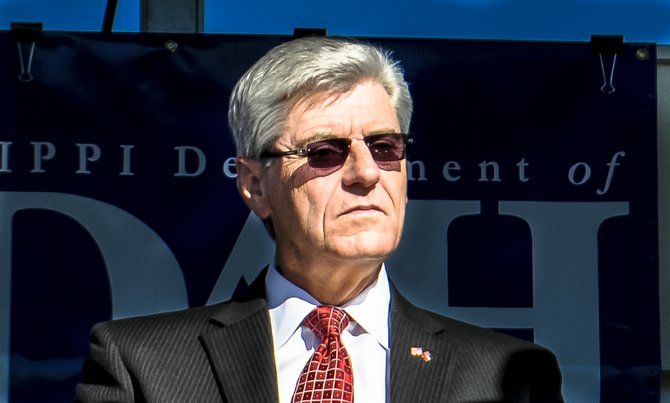Gov. Phil Bryant wants to test some people who apply for cash-assistance benefits for drugs. The courts might say otherwise. Photo by Trip Burns.
Gov. Phil Bryant has mined Florida for many of his bigger ideas, and his recent the drug-testing bill is no exception.
Drug testing for the working poor, mostly women, who receive monthly cash assistance from the federal government—called Temporary Assistance for Needy Families—was one of the keystones of Bryant's legislative agenda coming into the session.
The idea has been around for a while, but it has had little Mississippi success in recent years. With a new champion in Florida Gov. Rick Scott, drug testing has gained momentum the past couple years, such as in statehouses in Florida, Utah and Georgia.
While Scott's proposal certainly carried weight with ideological conservatives who believe the government wastes too much money on social programs, it became controversial for reasons that were not entirely political. In 2011, Scott came under fire for having ties to a company called Solantic Corp., a chain of urgent-care centers that Scott co-founded and held $62 million worth of stock in.
When pressed about the appearance of a conflict of interest, Scott told the Tampa Bay Times that he is not longer involved with the company because he put his investments into his wife's name, which Florida ethics officials cleared.
The Associated Press reported that the costs per drug screening would be $1.25 each; the drug test is $50, and drug treatments are $25.
Concerned about transparency and the potential for impropriety, Rep. Cecil Brown, D-Jackson, offered an amendment to Mims' bill that would subject drug-testing contracts to a public bidding process. Brown's amendment failed, and the House debated the bill for four hours before it passed 74-46. The House Public Health Committee had considered the bill earlier in the week. Mims, chairman of that committee, characterized it as a way to help people get drug treatment.
Under the bill, when someone applies for TANF, the applicant would answer a questionnaire. If the answers indicate possible use of illegal drugs, the applicant would have to undergo outpatient treatment for two months.
A federal judge recently struck down a similar measure in Florida—Scott vowed to appeal the decision—while Utah's law remains in place. Asked repeatedly about the scope of drug use among people on TANF in Mississippi, Mims said he did not have information about how big the problem is.
Mims told members that his proposal is different from the Florida law, which made drug testing mandatory for all applicants without screening them with a questionnaire. Mims said TANF benefits in Mississippi would be paid during treatment but would be cut off for the family if the parent tests positive for drug use at the end of treatment.
"It's about helping these people become better moms, become better dads, become better community members," Mims added.
Most Democrats objected and proposed a number of amendments, including several to drug test recipients of other types of state benefits, such as college scholarships. Rep. Adrienne Wooten, D-Jackson, put forth an amendment to test members of the Legislature at legislators' expense.
"It's only fair; it's only right," Wooten said.
The Mississippi Department of Human Services annual report says that for the 2013 budget year, which ended June 30, the average monthly payment to a family receiving TANF was $140, while the average payment to an individual was $67, meaning most people do not spend their entire allotment.
Utah started a drug-testing program for welfare recipients in 2012. A state agency found that the state spent $30,000 the first year and found 12 people who tested positive for drug use. Bryant said he believes Mississippi's program would cost about the same.
Rep. Steve Holland, D-Plantersville, the former Public Health Committee chairman, called it a "kick in the teeth" to a relatively small number of Mississippians working hard to better their lives.
"I challenge you to get outside your Southern comfort zone," and defeat the bill, Holland told his House colleagues.
Before it passed, David Myers, D-McComb, called it simply a waste of taxpayer money. "Let's tackle some real issues," Myers said.


